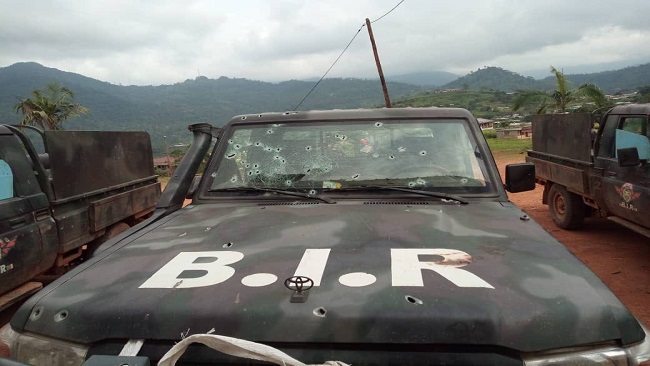Battle for Ambazonia: Casualty Figures High Because Fighters Are Well Armed
Elizabeth Etimu, 62, is inconsolable. Her son, Eric Etimu, a 27-year-old police officer, was killed Monday by separatist fighters in the English-speaking southwestern town of Mamfe.
Dozens of family members and well-wishers have been visiting their Emumbo, Yaounde, residence to console the widow. Eric’s uncle, 50-year-old military man Bruno Azegue, acts as spokesperson for the family. Just returned from Mamfe, says God saved him from the devastating war that killed four of the nine troops with whom he fought against the separatists for three months.
He says his wish and prayer is for the government to immediately negotiate an end to the war so that their disgruntled English-speaking brothers, who have taken arms and are not ready to lay them down until their grievances are attended to, return home and stop the loss of too many lives. He says the war has affected so many French-speaking Cameroonians either by killing, wounding and incapacitating their loved ones or ruining their economies.
Wounded French-speaking troops and their family members are asking the government of Cameroon to negotiate a peaceful end to the separatist war in its English-speaking regions. The soldiers, who have been flown to hospitals in Yaounde and Douala, say within the past two months, many of their peers are dying because the fighters have acquired modern weapons of war and have a mastery of the environment.
Currently at the Yaounde military and police hospitals, there are 32 wounded soldiers brought in within one month. The military says there are 14 in Douala.
Martial Monthe, 34, was part of the forces fighting separatists in the English speaking south west region is a survivor. He says for the first time since the war started, he saw separatists fighters using modern war weapons when they were attacked at Eyumojock.
He says one of their vehicles was pulled down by a bomb planted by the separatists. He says as they struggled to evacuate him and his wounded colleagues to the nearest hospital, they detected many other land mines and could not continue, and some of his already exhausted and wounded colleagues died from excessive bleeding as they were not able to treck to the nearest hospital that was 10 kilometers away.
Monthe said although he is a soldier ready to defend Cameroon all the times, he thinks a negotiated deal could spare the lives of many, especially now that the fighters seem to be importing more war weapons.
Cameroon’s police head, Martin Mbarga Nguele, visited the wounded policemen and the families of those who died in battle. He says all survivors and victims will be taken care of and Cameroonians should be proud of people who die defending them.
He says although the agony has been almost unbearable, Cameroonians should be proud they have heroes who agree to serve their beloved country by defending it and its people from every aggression even if it means paying the ultimate price. He says Cameroon will always remember them as people who died defending its territorial integrity and will also support their families.
Mbarga Nguele said the government will supply what it takes for the forces to crush the fighters.
Security analyst Christian Ndongo, consultant with the peace commission of the six member state Central Africa Economic and Monetary Commission says the fact that wars have persisted in central African countries for the past 12 years is an indication there is illegal trade and proliferation of arms that supply armed groups.
He says Cameroon and its neighbors, especially Nigeria, Chad and the Central African Republic, need to put in place permanent structures to examine and control the proliferation of weapons in their countries. He says the Boko Haram crisis, and the carnage in CAR are indications there are massive illegal movements of weapons across porous borders. He says the separatists in the English-speaking regions of Cameroon may be getting supplies from existing illegal suppliers.
The crisis in the northwest and southwest regions of Cameroon — now three years old — escalated on October 1, 2017, when militant secessionist groups symbolically proclaimed independence of an English-speaking state called Ambazonia.
The United Nations estimates at least 1,800 people have been killed and more than 530,000 displaced since fighting broke out. It says about 1.3 million people are in need of assistance.
Source: VOA





